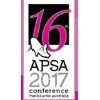Calendar
APSA 2017


APSA 2017 to reveal the pig science of tomorrow today
Although much has changed in the science behind pig production in the past 30 years, many of the topics researched and analysed remain much the same, including pig seasonal infertility and welfare.
First held in 1987 in Albury, New South Wales, the biennial Australasian Pig Science Association Conference, this year to be held at the Grand Hyatt, Melbourne, Victoria, November 19-22, will hear the latest science behind seasonal fertility, courtesy of Dr Ray King and Professor Alan Tilbrook will review advances in animal welfare.
Interestingly, at the inaugural APSA Conference, Dr David Hennessy reviewed seasonal infertility and Dr John Barnett reviewed welfare.
APSA President, Dr Pat Mitchell of Australian Pork Limited, said the 16th APSA would present cutting edge science, with speakers at the forefront of the global race to back pig production with meaningful science that not only raises questions but also answers them.
“All stakeholders invested in the business of producing pigs and pork, including scientists, producers, suppliers, regulators and associates, will be motivated, inspired and encouraged by what they will take home from APSA 2017,” Dr Mitchell said.
“Of course, the best take-home messages will be enjoyed by those who register, attend and network with colleagues, but for those who can’t, there is the opportunity to access the delivered science by purchasing the proceedings, ‘Manipulating Pig Production XVI’.
“By reflecting on what science has done, looking at what it’s now doing and, importantly, where it’s now heading, APSA effectively holds up a mirror to the future of pig science.”
New Zealanders Dr Lucy Waldron and Dr Shay Hill will edit the 2017 proceedings, which will later be published in full as a special issue of Animal Production Science.
After student and industry workshops on the first day of APSA 2017, Dr Ray King will deliver the AC Dunkin Memorial Lecture on seasonal infertility, providing collated information from international and Australian projects, including those commissioned by the Pig Research and Development Corporation, Australian Pork Limited and Co-operative Research Centre for High Integrity Australian Pork.
He will highlight the projects and their outcomes that have been presented at APSA to assist industry to alleviate the problem of seasonal infertility and he will then identify potential knowledge gaps and make recommendations for future research.
“Australia’s pig industry has spent considerable resources addressing the issues affecting pig production during summer, yet seasonal infertility remains a significant issue here and in many overseas countries,” Dr King explained.
“Seasonal infertility was one of the first major production syndromes that had research outcomes presented at APSA and it is a perfect example of how even with the best intentions and substantial robust research, some issues continue to cause production losses,” he added.
With Australia’s pork industry now recognised as a world leader in transitioning to higher welfare and the industry’s commitment to cease using sow stalls from this year, the timing of Professor Alan Tilbrook’s review of animal welfare underlines APSA’s commitment to providing a platform to promoting the science impacting contemporary challenges.
According to University of Queensland’s Professor Tilbrook, while great strides have been made in animal welfare assessment and attitudes towards facilitating positive affective states, advanced assessment methods are being developed to meet these changing demands.
His review will be a ‘where to from here’ reference piece, focusing on advanced assessment concepts and methods as the industry strives for objective assessment of animal welfare.
Other reviews at APSA 2017 include:
Prof John O’Doherty, Professor of Monogastric Nutrition, University College, Dublin and 2016 British Society of Animal Science Hammond award winner: ‘Current and novel feed additives – how they influence pig production’
Prof Darren Trott, Professor of Veterinary Microbiology at University of Adelaide: ‘The use of antimicrobials in agriculture – is agriculture really to blame for antimicrobial resistance?’
Heather Channon, Acting Research and Innovation General Manager, Australian Pork Limited: ‘Eating quality assurance for the pork industry. What has been achieved in 16 years?
A symposium on consumer wants will feature Dr Heather Bray, Senior Research Associate, University of Adelaide, Dr Darryl D’Souza, CEO of SunPork Solutions and Evan Bittner, Pork CRC PhD candidate at University of Melbourne.
Another symposium, on genetic improvement in a closed herd, will be addressed by Dr Kim Bunter of University of New England, New South Wales, Prof Dorian Garrick, Chief Scientific Officer, Institute of Veterinary, Animal & Biomedical Sciences, Massey University, New Zealand and Dr Matt Culbertson, Global Director for Product Development and Technical Services, PIC, USA.
According to APSA President, Dr Pat Mitchell, the fact that APSA 2017 has attracted world leading scientists in hot button issues such as pig genetics, genomics, nutrition, antimicrobial resistance, pork eating quality, consumer attitudes to pork and animal welfare, reflects the high profile APSA has in the global pig science community.
